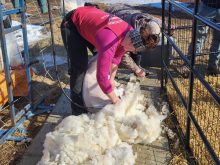Last week when trade minister Jim Peterson travelled to Washington for a brief first meeting with new United States trade representative Rob Portman, one item was guaranteed to be on the agenda.
“We certainly raised BSE as we always do,” Peterson said. “We expressed our concern and frustration and he explained his support for going ahead and opening the border on a science-based basis.”
Since May 20, 2003, few high level meetings between Canadian and American officials have been free of a discussion about BSE and Canada’s growing impatience with U.S. protectionism.
Read Also

Charges laid after cattle theft
Saskatchewan RCMP lay two charges against a man after six cattle went missing.
That prolonged dispute is putting a strain on the Canada-U.S. relationship, said Bob Keyes, Canadian Chamber of Commerce senior vice-president for international affairs.
“It has to affect the relationship,” he said. “And this becomes for many Canadians another piece of evidence that the U.S. does not play fair and they stack the deck against you.”
He said it is ironic that this bout of U.S. protectionism has been happening in a beef industry that for decades has been a symbol for how free trade can work.
“Does this take the shine off (free trade)?” asked the vice-president of the pro-free trade business lobby. “Sure it does. It makes people question why the free trade deal can’t fix this.”
Peterson said that is the wrong conclusion to draw.
“I think people have to look closely at what is happening,” said the trade minister. “This is not about the free trade deal not working. This is a small protectionist group that have gone outside the free trade deal by going to court.”
He said the deal is working, almost all Canada-U.S. trade is problem-free and the U.S. administration has been a strong ally.
“I know this has caused great frustration in our agriculture community but this does not reflect on the free trade agreements. We will continue to work in close co-operation with the American administration as well as the industry.”
At the Canadian Cattlemen’s Association, international relations director John Masswohl said the drawn-out dispute may actually have strengthened the Canada-U.S. relationship.
“I know it sounds counterintuitive but in some ways I believe it has deepened and strengthened the relationship,” said Masswohl, who worked as a trade officer in the Canadian embassy in Washington before he was hired last year for the CCA Ottawa office.
“Contacts between the agriculture minister and the agriculture secretary are more frequent and despite the fact that it has not been resolved in the court, Ottawa and Washington are allies on this.”
It is an optimistic view not shared by Conservative trade critic Belinda Stronach, who regularly blasts the federal Liberals for helping cause the long BSE delay by allowing the Canada-U.S. relationship to deteriorate.
“I really believe the leadership of this country has mismanaged the relationship,” said the Ontario MP and former auto parts executive with extensive experience in cross-border trade. “They have not built up the political capital necessary to resolve issues like this.”
She said the Liberals have not been focused enough on the issue of Canada-U.S. relations and have not succeeded in convincing the Americans that while it is a huge financial hit for Canada, it also is in the U.S. interest to resolve the dispute. Meanwhile, Americans continue to make decisions that give their critics ammunition.
“I feel free trade has been of benefit to both Canada and the United States and I don’t think the Liberals have properly managed the file to make sure it works to our best advantage,” she said. “And of course issues such as BSE and softwood lumber and the Byrd amendment do give the overall relationship a black mark.”
But Keyes said the BSE issue is not all bad news. He said it also shows the strength of the relationship because the Americans moved within months of the border closing to reopen it for cuts of younger Canadian beef.
“That partial opening had not happened in any other BSE situation and I think it is because of the special relationship,” he said. “As exasperating as it is for people caught up in this, it could be worse. If it was with some other country with which we do not have a special relationship, we’d be in even deeper doodoo.”
















